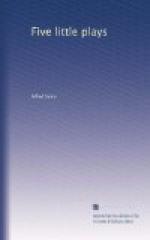LADY TORMINSTER. Ah, the future! Strange little syllables that hide so much! I can see you, introducing your wife to me, a little shyly—I can see myself, shaking hands with her—and with you.... My boy is seven already—time travels fast.... But it’s good to know that you really have loved me, all these years....
SIR GEOFFREY. By day and by night—you, and only you!
LADY TORMINSTER. And I have loved you—ah, yes, I have loved you!... And, having said this to each other, we will not meet again—till you bring me your wife.
SIR GEOFFREY. Ah—then!
LADY TORMINSTER. I have loved you, and I love you, for the fine, upright, loyal creature that you are. I love you for loving Jack; and it is Jack’s great quality in my eyes that he has been able to inspire such love. And, my dear friend, let us not be ashamed, we two, but only very proud, and very happy. We shall go our ways, and do our duty; but we shall never forget this talk we have had to-night.
SIR GEOFFREY. [Gently.] I am beginning to understand....
LADY TORMINSTER. You will be less lonely in future ... and I no longer afraid of the stars.... Brave heart—oh, brave little heart that I for a moment have held in my hands!
SIR GEOFFREY. [With a passionate movement towards her.] Gertrude!
LADY TORMINSTER. [Lifting a finger.] No—stay where you are.... Those are the first rays of dawn—I must go.... Good-bye. We have no need to shake hands, you and I.... Ah, Geoffrey—good-bye!
[She goes swiftly,
and closes the door. He bends his head, and
remains standing, motionless,
by the table.
CURTAIN
THE BRACELET
A PLAY IN ONE ACT
THE PERSONS OF THE PLAY
HARVEY WESTERN
HIS HONOUR JUDGE BANKET
MARTIN
WILLIAM
MRS. WESTERN
MRS. BANKET
MISS FARREN
SMITHERS
TIME—The present
Produced at the Liverpool Repertory Theatre on Feb. 26, 1912
THE BRACELET
The dining-room in an upper middle-class house
near the Park. It
is furnished in the
conventional modern style, soberly and
without imagination.
The room is on the ground floor, facing the
street, the door is
to the right, and leads into the hall. To the
left of this door is
a sideboard, glittering with silver. Three
tall windows, at the
back heavily curtained; between them hang
two or three family
portraits. The table, on which there is the
usual debris of a meal
that is over—coffee-cups,
liqueur-glasses, etc.—has
been laid for four persons, and their
four chairs are still
around it. The fireplace, with its rather




